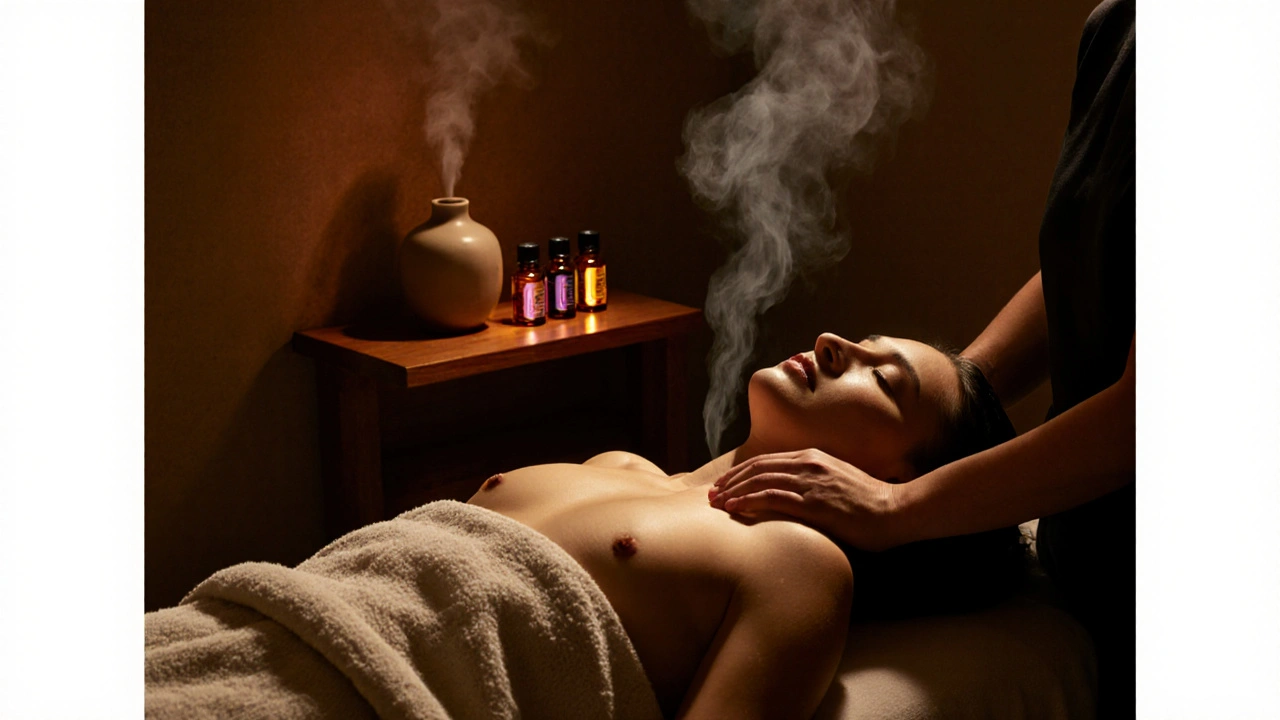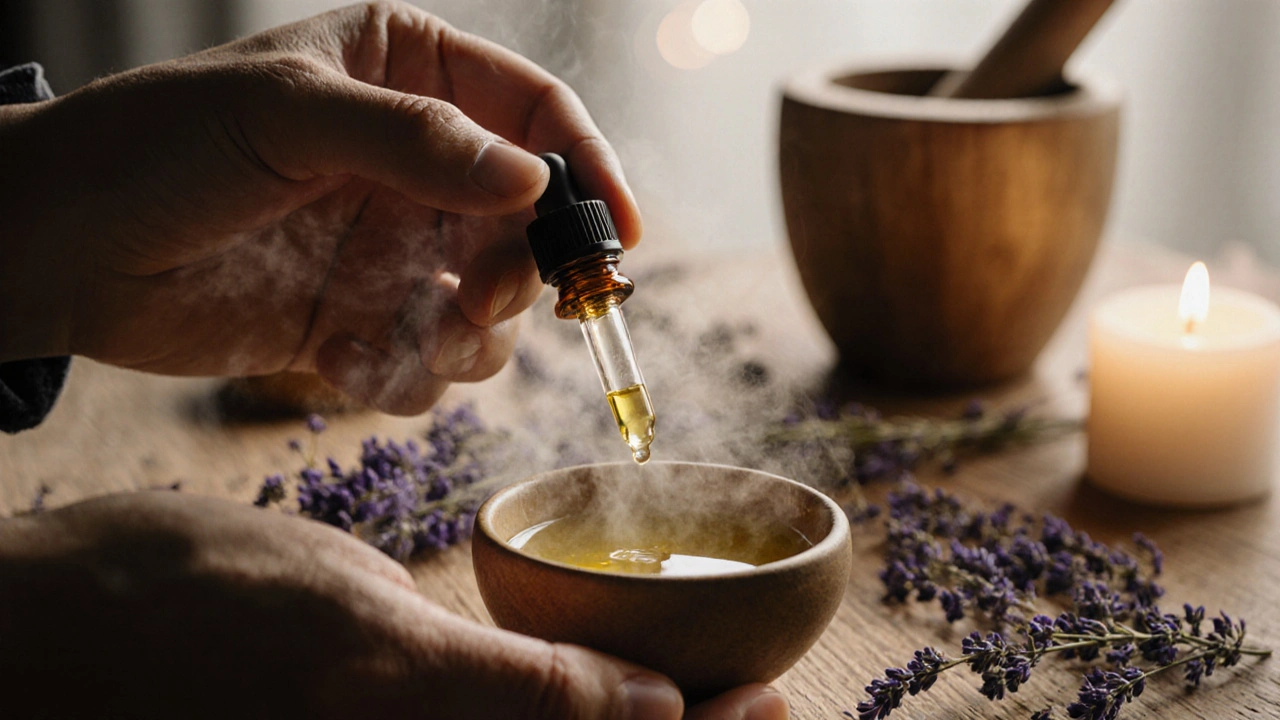Aromatherapy Massage: Natural Relief for Modern Stress

- Nov, 18 2025
- 0 Comments
- Joshua Snowden
Aromatherapy Blend Calculator
Find Your Personalized Stress Relief Blend
Select your primary stress symptom to receive a customized essential oil blend recommendation. Based on research from the University of Auckland and other clinical studies.
Your Custom Blend
Lavender - Soothes anxiety and improves sleep quality
Bergamot - Boosts mood and reduces cortisol
Frankincense - Calms emotional overwhelm
How to use:
Mix 3 drops of each oil with 1 tablespoon of carrier oil (sweet almond or jojoba). Apply to temples, wrists, and soles of feet during self-massage. Breathe deeply for 5 minutes.
Important Safety Notes:
Pregnant women should avoid rosemary and clary sage. Always do a patch test first if you have sensitive skin. Consult your doctor if you have epilepsy or are on medications.
You know that feeling? The one where your shoulders are stuck near your ears, your jaw won’t unclench, and your brain won’t shut off even when you’re lying in bed at 2 a.m.? It’s not just being tired. It’s modern life wearing you down-endless notifications, back-to-back Zoom calls, traffic jams, and the quiet pressure to always be doing more. If you’ve tried meditation apps, sleep masks, and even that fancy weighted blanket, but still feel like you’re running on fumes, there’s a simple, ancient solution that’s been quietly working for centuries: aromatherapy massage.
What Exactly Is Aromatherapy Massage?
Aromatherapy massage isn’t just a massage with a nice smell. It’s the intentional blending of therapeutic-grade essential oils with hands-on bodywork to calm the nervous system, ease muscle tension, and lift emotional heaviness. Think of it as a two-pronged attack: touch and scent working together. The pressure from the therapist’s hands releases physical tightness, while the scent molecules from oils like lavender, bergamot, or frankincense travel straight to your brain’s limbic system-the part that controls emotions, memory, and stress responses.
Unlike regular massage, where the focus is purely on muscles and joints, aromatherapy massage targets your whole state of being. A 2023 study from the University of Auckland tracked 120 adults with chronic stress and found that those who received weekly aromatherapy massage for six weeks reported a 42% drop in cortisol levels-the body’s main stress hormone-compared to just 11% in the control group who got standard massage without oils.
How Essential Oils Work on Your Brain
Essential oils aren’t just fragrant liquids. They’re concentrated plant extracts packed with bioactive compounds. When you inhale them during a massage, those molecules enter your nose, bind to receptors, and send signals directly to the amygdala and hippocampus. These areas don’t care about your work email or your to-do list. They respond to scent like a direct line to your inner calm.
Lavender oil, for example, contains linalool and linalyl acetate-compounds shown in multiple clinical trials to slow down overactive brain waves linked to anxiety. Bergamot, a citrus oil, boosts serotonin and dopamine, the feel-good neurotransmitters that often dip under chronic stress. Eucalyptus clears mental fog. Ylang-ylang lowers heart rate. These aren’t marketing claims. They’re measurable effects documented in journals like Phytotherapy Research and Journal of Alternative and Complementary Medicine.
During a session, your therapist doesn’t just dab oil on your skin-they blend it into a carrier oil like sweet almond or jojoba, then use long, flowing strokes to help your body absorb both the physical pressure and the chemical signals. The warmth from your skin helps release the scent slowly, so you’re breathing it in for the entire 60 to 90 minutes.
Why It Beats Other Stress Relief Methods
People try all kinds of things to unwind. Some meditate. Some take supplements. Some scroll through cat videos for hours. But here’s the catch: most of these only work while you’re doing them. Once you get back to your desk, the stress creeps in again.
Aromatherapy massage is different. It doesn’t just distract you-it resets you. The combination of tactile stimulation, deep breathing (which most people forget to do when stressed), and targeted plant chemistry creates a neurological reset. Your parasympathetic nervous system-the one responsible for rest and digestion-finally gets the signal to turn on.
Compare it to a cup of tea. Tea might relax you for 20 minutes. Aromatherapy massage gives you 48 to 72 hours of lingering calm. Why? Because the oils don’t just vanish. They linger on your skin and in your memory. The scent of lavender, for instance, can trigger the same calming response weeks later, just by catching a whiff of it on your pillow or in a candle.

What Happens During a Typical Session?
It starts with a quiet conversation. Your therapist asks about your stress triggers-work, sleep, relationships, pain points. They don’t just hand you a standard blend. They tailor it. If you’re overwhelmed and can’t sleep, they’ll use lavender and chamomile. If you’re drained and mentally foggy, they’ll reach for rosemary and peppermint. If you’re holding anger or grief in your chest, citrus oils like orange or grapefruit help lift that emotional weight.
Then you lie down on a warm table, covered with a soft towel. The room is dim, maybe with soft instrumental music playing. The therapist warms the oil between their hands, then begins-slow, rhythmic strokes along your back, shoulders, arms, legs. No loud music. No talking. Just breath. And scent.
After 60 minutes, you don’t just feel relaxed. You feel lighter. Like a weight you didn’t even know you were carrying has been gently lifted. Your breathing deepens. Your eyes feel softer. Your thoughts slow down. That’s not placebo. That’s neurochemistry.
Who Should Try It-and Who Should Skip It?
Aromatherapy massage is safe for most adults. But it’s not one-size-fits-all.
- Great for: People with chronic stress, insomnia, anxiety, muscle tension from sitting all day, or emotional burnout. Also ideal for those who’ve tried other therapies but still feel stuck.
- Use caution with: Pregnant women (only use oils approved for pregnancy-lavender and citrus are generally safe; avoid rosemary and clary sage). People with severe asthma or allergies-always ask for a patch test first. Those with sensitive skin or eczema-make sure the carrier oil is non-comedogenic.
- Avoid entirely: If you’re undergoing chemotherapy or have epilepsy, consult your doctor first. Some oils can interact with medications or trigger seizures in rare cases.
Most reputable therapists will ask for your medical history. Don’t skip this step. It’s not bureaucracy-it’s safety.
Can You Do It at Home?
You can. But it’s not the same.
Massaging yourself with lavender oil while watching TV might give you a moment of calm, but it won’t deliver the full therapeutic effect. Why? Because true relaxation requires surrender. When someone else is touching you with skilled hands, your brain stops monitoring your body. You stop being the controller. You stop worrying about doing it right. That’s when deep relaxation kicks in.
That said, if you can’t afford regular sessions, try this: After a long day, warm a teaspoon of sweet almond oil with 3 drops of lavender oil. Rub it into your temples, the backs of your wrists, and the soles of your feet. Breathe deeply for five minutes. Lie down. Don’t check your phone. Just be still. It won’t replace a professional session, but it’s a powerful daily reset.

How Often Should You Get It?
There’s no rule. But here’s what works for most people:
- For acute stress: Once a week for 3-4 weeks, then reassess.
- For maintenance: Every 3-4 weeks keeps cortisol levels steady and prevents burnout from creeping back.
- For deep emotional release: Some people benefit from monthly sessions over several months, especially after grief, breakup, or major life changes.
Think of it like brushing your teeth. You don’t wait until your gums bleed to do it. You do it daily because prevention beats repair.
What to Look for in a Therapist
Not all massage therapists are trained in aromatherapy. Look for someone with certification from a recognized body like the International Federation of Aromatherapists or the National Association for Holistic Aromatherapy. Ask:
- "Do you use 100% pure, therapeutic-grade essential oils?" (Avoid anything labeled "fragrance oil"-those are synthetic.)
- "Can you customize the blend based on my needs?"
- "Do you offer a patch test for sensitive skin?"
Good therapists will explain what each oil does. They won’t just say, "It’s relaxing." They’ll tell you why lavender works on your nervous system, or how bergamot reduces cortisol. That’s expertise.
And don’t be shy about price. A session typically costs between $80 and $140 in New Zealand, depending on location and experience. It’s an investment, not an expense. Think of it as preventive healthcare-like a dental checkup for your nervous system.
The Real Benefit Isn’t Just Relaxation
The biggest myth about aromatherapy massage is that it’s just for pampering. It’s not. It’s medicine. Quiet, gentle, plant-based medicine.
People who commit to regular sessions report more than just better sleep. They say they’re less reactive. They don’t snap at their partner after a bad day. They notice when they’re starting to feel overwhelmed-and they pause before it turns into panic. They remember to eat. They breathe. They feel human again.
In a world that rewards constant doing, aromatherapy massage is a radical act of stillness. It doesn’t fix your life. But it gives you the space to breathe through it.
Can aromatherapy massage help with anxiety?
Yes. Multiple studies show that essential oils like lavender, bergamot, and frankincense reduce anxiety symptoms by lowering cortisol and activating the parasympathetic nervous system. A 2022 meta-analysis of 17 clinical trials found that aromatherapy massage was significantly more effective than standard massage alone for reducing anxiety in adults.
Are essential oils safe for everyone?
Not always. Some oils can irritate skin or interact with medications. Pregnant women, people with epilepsy, asthma, or those on blood thinners should consult a doctor before use. Always ask for a patch test and use only 100% pure, therapeutic-grade oils-never synthetic fragrances.
How long do the effects last after a session?
Most people feel calm for 48 to 72 hours after a session. The scent lingers on skin and in memory, triggering relaxation even after the massage ends. Regular sessions (every 3-4 weeks) help maintain lower stress levels over time.
Can I use essential oils on my own without a massage?
Yes, but the full benefit comes from the combination of touch and scent. Applying oil to your wrists or using a diffuser helps, but a trained therapist’s hands create deeper physical and emotional release. Self-massage is a good daily habit, but not a full replacement.
What’s the difference between aromatherapy massage and regular massage?
Regular massage focuses on muscles and joints. Aromatherapy massage adds targeted essential oils that affect your brain’s emotional centers. The result is deeper relaxation, reduced anxiety, and longer-lasting stress relief-not just physical ease.